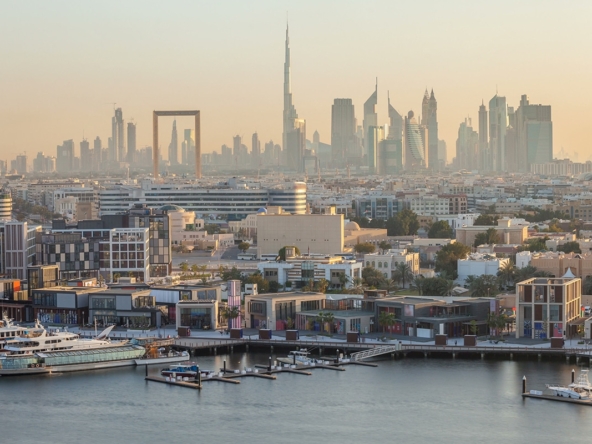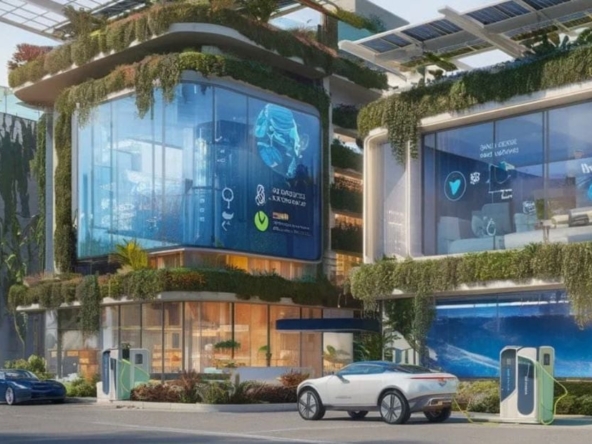Dubai’s property market saw historic growth in 2024. In an exclusive interview, Bayut’s Vice President of Property Sales, Fibha Ahmed explains what’s fuelling demand and where investors are looking next.
Dubai’s real estate market has reached unprecedented heights in 2024, achieving a record-breaking AED 488 billion in residential transactions. This remarkable surge highlights the city’s rapid growth and global appeal. In an exclusive conversation with Bayut’s Vice President of Property Sales, Fibha Ahmed, she sheds light on how Dubai’s real estate sector has transformed into a powerhouse for international investors. With nearly 170,000 property transactions recorded and a remarkable influx of millionaires choosing Dubai over traditional hubs like the U.S., Ahmed offers valuable insights into the emirate’s evolving landscape, shaped by ambitious developments and strategic policy reforms.
How has Dubai’s residential real estate market performed in 2024 in terms of sales, rentals, and overall demand? Dubai’s residential property market demonstrated exceptional performance throughout 2024, experiencing notable growth in transactions, increasing property values, and a surge in demand across all sectors. The annual market report recorded over 169,000 sales transactions worth AED 488 billion, including 102,000 off-plan deals amounting to AED 213 billion and 67,000 ready property transactions valued at AED 274 billion.
The city’s rising appeal to high-net-worth individuals (HNWIs) has been a key driver of this growth. Forecasts suggest that approximately 6,700 millionaires will relocate to Dubai by the end of 2024, nearly double the number opting for the United States. This increasing demand has fueled the expansion of the luxury property segment, with approximately 28,700 villas set for completion by 2025.
The rental market has also flourished, particularly in premium areas known for their superior amenities and connectivity. Arabian Ranches and Downtown Dubai remain among the most sought-after locations, while off-plan developments in Dubai Harbour, Jumeirah Village Circle, and Al Furjan have attracted strong interest from investors and end-users alike.
Dubai’s population has grown to 3.825 million in 2024, reinforcing the need for continuous infrastructure and real estate developments to accommodate the expanding community.
What were the main factors influencing the market’s performance in 2024? Dubai’s status as a secure, business-friendly, and tax-efficient destination has continued to attract HNWIs and expatriates. Infrastructure advancements, including the expansion of the Dubai Metro, new residential and commercial districts, and iconic leisure destinations such as Dubai Harbour and Expo City Dubai, have further strengthened its position as a global real estate hub.
The rising number of expatriates and professionals moving to Dubai has significantly impacted both the sales and rental markets. The city’s ability to cater to its growing population through diverse real estate projects has been crucial to sustaining market momentum.
Government-led investor-friendly reforms have also played a pivotal role in shaping the market’s trajectory. Policies such as the introduction of long-term Golden Visas, Green Visas, and expanded retirement residency programs have made property investment more appealing by providing long-term security. Additionally, relaxed business ownership regulations and incentives to attract skilled professionals have reinforced investor confidence and driven property demand.
How has demand varied across different property types (luxury, mid-range, affordable housing)? Dubai’s real estate market in 2024 witnessed diverse buyer preferences across multiple property segments. Luxury properties remained highly desirable, particularly in exclusive locations like Palm Jumeirah and Downtown Dubai. These high-end communities continue to attract affluent buyers seeking prime real estate investments. Similarly, villas in Dubai Hills Estate and Arabian Ranches saw substantial demand, emphasizing the strength of the luxury housing sector.
For mid-range housing, Jumeirah Village Circle (JVC) maintained its popularity, with buyers favoring both villas and apartments due to the area’s excellent connectivity and lifestyle amenities.
The affordable housing segment also experienced significant activity, with increasing interest in Dubai South and Damac Hills 2. These emerging communities have become focal points for budget-conscious buyers, including first-time homeowners and investors seeking cost-effective opportunities. Additionally, affordable apartments in Dubai Silicon Oasis (DSO) and Arjan remained in demand, showcasing a preference for properties that offer value without compromising on accessibility.
Which areas were most in demand for rentals? Dubai’s rental market in 2024 mirrored the broad spectrum of buyer interests, catering to varying lifestyle preferences. Luxury apartments in prestigious neighborhoods like Palm Jumeirah and Downtown Dubai retained their appeal, attracting tenants looking for exclusivity and world-class amenities. Villas in Dubai Hills Estate and Arabian Ranches continued to be in high demand, further solidifying the city’s premium rental segment.
For mid-range rental options, Jumeirah Village Circle (JVC) and Al Furjan remained top choices, offering tenants a balance of affordability and modern living. These areas gained popularity due to their strong infrastructure, lifestyle offerings, and accessibility.
The affordable housing market saw increased interest in Dubai South and Damac Hills 2, emerging as sought-after locations for budget-friendly rentals. Apartments in Dubai Silicon Oasis (DSO) and Arjan also attracted tenants looking for high-value residences in well-connected neighborhoods.
How has supply evolved in 2024? Dubai’s real estate supply in 2024 adapted to meet the surging demand across various segments. The annual market report revealed a 58% rise in listed properties for sale, driven by numerous new launches catering to luxury, mid-tier, and affordable housing segments. This growth aligned with a 66% increase in buyer demand for properties listed on Bayut.
Luxury real estate developments witnessed notable expansions, particularly in iconic locations such as Palm Jumeirah and Dubai Hills Estate. Attractive payment plans and visa incentives further fueled international investor interest.
In the mid-range and affordable housing categories, developers introduced a variety of projects to meet the needs of Dubai’s growing expatriate population. A mix of ready and off-plan properties ensured diverse options for potential buyers.
Additionally, the average price per square foot for listed properties increased by approximately 35% in 2024, reflecting the city’s rising property values and the growing demand for high-quality developments.
Which areas are projected to see strong demand in 2025? Dubai South is poised for significant growth due to its proximity to Expo City and Al Maktoum International Airport. Similarly, Dubai Creek Harbour is gaining traction as a major waterfront and cultural destination. Communities like Mudon and Studio City are also experiencing increased demand, driven by new inventory and their family-friendly environments.
Jumeirah Village Circle (JVC) is expected to sustain its appeal among buyers and renters due to its evolving infrastructure and attractive lifestyle offerings. Furthermore, eco-conscious communities such as The Sustainable City and Tilal Al Ghaf are anticipated to attract greater interest, reflecting the rising demand for sustainable living solutions.
What is the outlook for Dubai’s real estate market in 2025? Dubai’s residential real estate sector is forecasted to maintain its upward trajectory in 2025, supported by continued population growth, with the city expected to exceed 4 million residents. Demand across all property segments, from off-plan developments to mid-range and luxury homes, is set to remain strong.
One of the key trends shaping the market is the increasing emphasis on transparency and technological advancements. AI-driven tools, such as the DLD’s Smart Rental Index, are empowering tenants and landlords with real-time market insights, ensuring informed decision-making. This index, updated daily, provides an accurate reflection of Dubai’s rental market, offering a clearer perspective on pricing trends and demand shifts.
As Dubai continues to innovate and expand, its real estate sector is well-positioned to remain one of the most dynamic and sought-after markets globally in the coming years.



